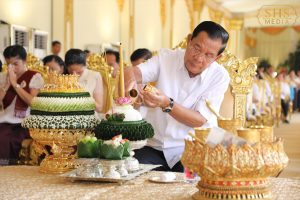On Monday, lawyers for Cambodia’s ruling party filed a lawsuit accusing a leading rights activist of defamation and seeking $500,000 in damages, the latest development in the country’s rolling political crackdown.
The complaint was filed in Phnom Penh Municipal Court against Soeng Senkaruna, the deputy head of the Cambodian Human Rights and Development Association (ADHOC), one of the country’s main human rights groups. According to The Associated Press, it was filed on the order of former Prime Minister Hun Sen, the former leader of the Cambodian People’s Party (CPP), who stepped down and handed power to his son in August, after more than 38 years in office.
The lawsuit asserts that Senkaruna dishonored the CPP in a Khmer-language interview with The Cambodia Daily last week, in which he stated that the ruling party has used its influence with the courts to put pressure on its political opponents – a thesis that this week’s lawsuit only seems to confirm.
It quoted Soeng Senkaruna as saying that political disputes should be resolved politically and not through the courts and stated the CPP has “always used the courts as a barrier to oppress its opposition political partners.”
The lawsuit alleges that the “remarks were exaggerated and dishonest,” in the AP’s paraphrase, and could tarnish the CPP’s public reputation ahead of Senate elections on February 25, even though ordinary voters will not participate. (Senators are elected only by members of the country’s commune, district, provincial and municipal councils.)
Senkaruna is just the latest critic of the Cambodian government to be hauled into court for voicing routine or mundane criticisms of the authorities, a number of whom have seen them ordered to pay punitive damages after being convicted of defamation. In October 2022, the same Phnom Penh court convicted Son Chhay, the vice president of the opposition Candlelight Party (CLP) of defaming the CPP, after he claimed that the local elections held the previous June were marred by fraud, a verdict that was upheld by the Supreme Court last year. He was ordered to pay the party $1 million in damages, a case that Senkaruna specifically cited in his interview with The Cambodia Daily. Needless to say, the result in such cases is generally preordained, unless Hun Sen chooses to file the lawsuit.
ADHOC has also previously been targeted in previous peaks of political repression. In April 2016, four staffers from the organization were arrested on bribery charges, prompting ADCHO’s former executive director, Thun Saray, to flee abroad to avoid arrest.
The lawsuit also comes just days after three politically active Cambodian exiles were arrested in Thailand ahead of Prime Minister Hun Manet’s first visit to the country later this week. The three, two of whom were members or former members of the CLP, were reportedly planning protests to coincide with the Cambodian leader’s visit.
All of this has been part of the same rolling crackdown that has proceeded over much of the past decade, smothering civil society, the independent media, and most meaningful sources of opposition. (Among the many casualties was The Cambodia Daily, which was forced to close its doors in 2017 and now publishes from abroad, and only online.) This allowed the CPP to run in the 2018 and 2023 elections nearly unopposed, and formalize its control over nearly every political institution in the country.
This week’s lawsuit, even though it was filed by Hun Sen rather than his son, is the latest sign that political expression and dissent will continue to be treated as unlawful activities under the new-look Cambodian leadership. While any significant political changes would likely take time, Hun Manet’s government has so far shown little indication that it has any intention of changing course.

































